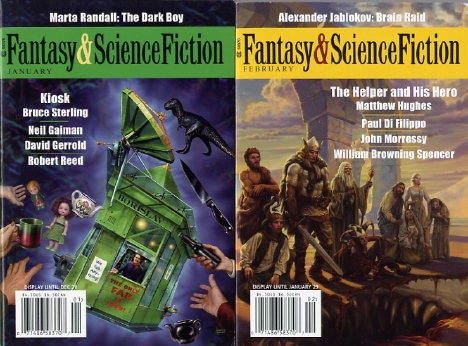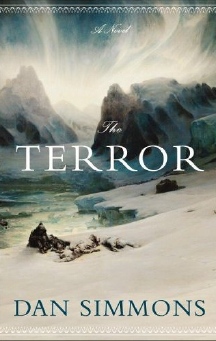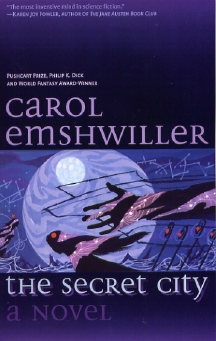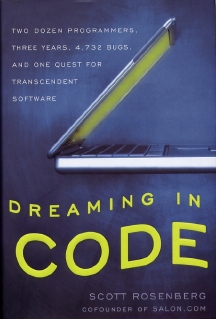Trashotron.com |
||
This Just In...News From The Agony Column
01-12-07: Fantasy & Science Fiction Double Header
Fantastic Months
 |
Two
great issues well worth your time and money. |
Yes, I whinge about The Magazine of Fantasy and Science Fiction when they ship me great fiction with a great cover that gets covered by an address label. But I sure as hell subscribe and so should you. The last two months of this magazine have indeed been fantastic, worthy of both your time and you money, with a to-die-for lineup of great fiction short and long. Better still, they're putting the address label on the back cover.
So you can see my scans of the last two months sans any personal information. It makes it so much easier to compliment them when I don’t have to x-out my own address from the cover illo. Of course, none of that would matter one whit, really, since the last two months have featured a cavalcade of verifiably great writing.
Let's ratchet back to January, oh wait, this is January. Well, the January issue at any rate, which includes the proviso that is should not be displayed after December 28. yet here I am displaying the January issue in January, so I presume that they'll have to send the mattress tag police to get me. They may take me alive but they won’t get my magazines.
So how can you resist a magazine that features a new novella by Bruce Sterling at his very best, and he's always at his best, but this is the sort of best we pretty much expect and really like from Sterling. This is goofy high-tech silly fun in the form of 'Kiosk' a lovely little story about fab-tech and all its implications as only Sterling can unpack them. Fun stuff, smart stuff. Sure, Neil Gaiman's 'How to talk to Girls At Parties' first appeared in 'Fragile Things', but we'll take our Neil Gaiman where we can find him. Reading a mix of stories is the idea behind subscribing to a magazine, right? Add to that mixc David Gerrold's angry metafictional 'The Strange Disappearance of David Gerrold' and you've already sold me three times over. Robert Reed's 'X-Country' will give those readers who run pause to think and another really good excuse not to, while Marta Randall's 'The Dark Boy' and Jeremy Minton's 'The Darkness Between' offer all the darkness you need and perhaps more than you expect. Let Lucius Shepard loose his verbal slings and arrows on the execrable remake of 'The Wicker Man', Charles DeLint and John Kessel (good last name!) loose on books, and you've spent an enjoyable Saturday afternoon without having to leave home.
I can let the mattress police relax when I talk about February's issue. Matthew Hughes brings back Guth Bandar from 'Black Brillion' for 'The Helper and His Hero' a long first part of a two-part serialization. Alexander Jablokov returns with the "novelet" 'Brain Raid', William Spencer Browning honors Robert E. Howard in 'Stone and the Librarian', the late John Morressy's 'Fool' escapes from inventory and Pynchon-influenced newcomer S. L. Gilbow gets a shot with 'Red Card'. Charles DeLint and Michelle West take up the book duties, Kathi Maio talks about the graphic novels, comics and the recent French film 'Renaissance' and the jocular Paul Di Filippo steps up to the very strange altar of 'Our Feynman Who Art In Heaven'. A heavenly fast, indeed. And even if you buy 'em both on the newsstand at your local independent bookstore to obviate the possibility of a gnarly address label, a steal at $4.50 a pop. Fantastic.
01-11-07: Carol Emshwiller Unveils 'The Secret City'
Naturally Unnatural
Why oh why? We are positively surrounded with fantastic writers of the fantastic, folks whose work should be hotly anticipated by sleazy middle-of-the-road entertainment magazines, lauded by empty-headed know-nothings with prefab faces, celebrated by meaningless glitzy award shows complete with popping flashbulbs and microphones thrust from hidden fists.
Why are we who read these books so fortunate to have them as ours and ours alone, our secret secrets? Or in this case, 'The Secret City' (Tachyon Books ; April 2007 ; $14.95) by should-be superstar Carol Emshwiller. It's not as if Emshwiller hasn't won, like The Pushcart Prize, the Philip K. Dick Award and the World Fantasy Award, plus half a page more. She's not hiding out. But perhaps she at least feels that way, given the title and subject of her newest novel. No matter, it is a secret no more. Or at least not to those who read this column.
Emshwiller's latest displays her incredible talent for writing naturalistic prose about unnatural situations, as well as her ability to create a compact level of intensity. 'The Secret City' starts when Lorpas, one of a group of alien tourists stranded on Earth, is rounded up by the cops. Ever hoping to return home, they've never assimilated into the masses of humans whom they resemble so much. Of his parents, Lorpas says, "The home-schooled us sop that we knew more about a distant world and its wars and landmasses than we knew of this one."
Obviously, Emshwiller's not offer readers another alien invasion novel, though an invasion of sorts occurs. Or more precisely a rescue by fellow-aliens who are ill equipped to deal with this world. Heck they might as well be humans. They've got the xenophobia down pat. Now all they need are guns and politics. Oops, turns out those are pretty universal as well. Or if not universal, easily gettable here on Earth. Nothing is more universal than senseless conflicts driven by ignorance and selfishness. Oh the humanity.
Emshwiller's newest novel is a blazing fast read, but it's also a pithy look at insider and outsider, whether they are human or otherwise. It's her prose that carries this book, the simple straightforward voice that drives the novel. Emshwiller uses the simplest devices of the science fiction canon like great whacking levers to get incisive looks at issues that affect real human right now. She makes the conflicts that drive our everyday lives seem fantastic and utterly real, she uses the genre to re-invent the world for the reader.
Genre fiction, of course, creates its own outcasts. Those of us who are willing to and indeed enjoy reading science fiction have our own Secret Cities, and we damn well hope that the aliens are arriving like, tomorrow to get us the hell out of Dodge. I remember when I first started reading the Edgar Rice Burroughs Martian series. I was in fifth grade and my friends and I, the outcasts of reading, called ourselves Red Martians, just like humans, it seems only different. Do you feel just like a human – only different? Are you hoping against hope that someone is out there, coming to rescue you? And do you fear that they might be no better than those from whom you hope to be rescued? You can run. You can hide. Or better still, you can understand, escape from this world into the fictional world of Carol Emshwiller just long enough to grok that, no matter how hard you look for your home, you might never find it. Until you look in the mirror and realize that we all carry our homes with us. You. There is no place like You.
01-10-07: Dan Simmons Explores 'The Terror'
Historical Horror
Dan Simmons may not know what’s right for his career, but he sure knows what’s right for his readers. Having just published the acclaimed duet 'Ilium' and 'Olympos', well over a thousand pages of dense peculiar, post non-standard Singularity fiction, I'm sure his career advisers were wishing he'd deliver them a nice near future, toe-tapping techno-thriller, full of buxom babes and flying car chases. But Simmons has time and again evaded the expectations, or at this point the vain hopes, of his publicists. These folks have got to know by now that just as Simmons gets going in one direction, he turns and takes a new tack.

THE TERROR! THE TERROR!
In this case, he's gone from baroque science fiction to a dense, compelling novel of historical horror, 'The Terror' (Little Brown / Hachette Books ; January 8, 2007 ; $25.99). And yes, there is terror to be found here, both expected and unexpected. Moreover, Simmons is engaging in a tour to promote the novel. Here's the schedule. It's been a long time since he's been on the road and one can easily imagine the readers lugging stacks of interim novels to be signed. I hope he's brought his carpal tunnel meds and wrist braces. Cold seems to be a theme that send Simmons on tour, since the last time he was around here, at any rate, was when his novel 'A Winter Haunting' came out. That novel as well involved a horror story played out against a frigid background.
'The Terror' is in fact the name of the ship captained by Francis Crozier, who, with Sir John Franklin at the helm of the Erebus, left in May of 1845 on the Northwest Passage Expedition. They never returned and what become of them is unclear at best. Dan Simmons simply applies his ample imagination to the problem.
Well, simple is not the word you'd first choose to describe a novel is some 784 pages long and yet manages to keep up a crisp pace by clever cross-cutting and literary experiments just-reigned-in enough to render them transparent. 'The Terror' offers all the immersive thrills of great historical fiction with a nice genre-fiction twist that is eminently satisfying to those of us who enjoy such goings-on.
What’s interesting here is how Simmons uses aspects of the historical novel to create veracity when he slides off into his surreal, supernatural, science-fictional premise. By the time you get there, and I'm not going to tell you where "there" is, you've been so thoroughly immersed in true-life detail that you're willing to follow the author wherever he takes you. And he also manages to successfully up an already high level of adventure.
Interesting as well is the ease with which Simmons' world-building skills, honed in complex science fiction like the aforementioned 'Ilium' and 'Olympos', are translated into historical fiction. The similarities between world-creating science fiction (like, for example, 'Dune') and historical fiction have often been commented upon. What I find fascinating as a literary critic is the fact that science fiction, a relative latecomer to the literary canon, is the genre that has given us the best tools for describing what historical novelists have long been doing. If one were feeling very expansive, one could easily claim that the number-one job of the writer is in fact world-building, because every writer wants to immerse their readers in a literary experience. It's only now that we've figured out how to describe what writers have been doing from day one. Thanks to the science fiction genre.
It's no surprise then that we'd discover this most clearly in the work of Simmons, who writers everything and writes it well. If you are not cold enough in this era of global warming Dan Simmons 'The Terror' will put a chill on everything except your desire to turn the pages faster, ever faster.
Immerse.
01-09-07: Scott Rosenberg is 'Dreaming in Code'
Searching for Chandler
Bourne shell scripts. Software tools installations. Product management tools configuration. Talk about fear.
Talk about agony.
I have escaped. Sort of. As much as any of us can, these days.
Which is, truth to tell, not much. What used to be just a difficult profession is now a difficult requirement for anyone who uses computers. Systems administration, my old job, is now something everyone has to do just in order to keep up with the world. Not that it's become any easier. No, it's just that most of us actually need a working computer with online access, email accounts and decent regular backups in order to keep up with our jobs, our friends and our sanity. My curse, long ago uttered at 11:30 PM while still embroiled in some hellacious software installation gone very wrong, has finally come to pass.
You're all systems administrators now.
And as such, the book 'Dreaming in Code' by Scott Rosenberg (Crown Books / Random House ; January 23, 2007 ; $25.95), is pretty much essential reading. You think you have it bad, trying to navigate through the muddle of instructions to configure your wireless hub? You're only in the borderlands of hell, my friends. The balmy Balmer suburbs. Rosenberg has been to the Ninth Circle, he's seen Gates^H^H^H^H^HSatan himself buried upside-down in ice. Trying to debug a failed ERP implementation while the accounting department leaves early, unable to work because he^H^Hsomeone screwed the AP-UPDATE function with a badly installed patch. Oh the glory that shall be yours, all yours.
'Dreaming in Code' is Rosenberg's story of the efforts to develop Chandler. Oooh, memory lane time. I've always hated MS Outlook. It's deeply EVIL. And so anyone who was going up against Outlook was My Friend in a big, big way. I counseled all my corporate customers to avoid Outlook if at all possible. I knew it as a veritable cornucopia of horror, the king of kludge. Rosenberg, co-founder of Salon.com, spent three years with the crack folks who embarked on a quest to build a huge piece of software pretty much from chicken scrapings and old Bourne shell scripts. It was intended to be an "Outlook killer". What came of this effort, led by Lotus 1-2-3 creator Mitch Kapor? Hell, back in the day, I replaced a $20K annual service from Control Data that generated inaccurate and unusable reports on blood factory engineering project spending with a $5K IBM PC and Lotus 1-2-3 macros. So I know what that guy Kapor can do from chicken scratchings and shell scripts. He can RULE THE WORLD. Suffice it to say that Chandler is not in the news. I refer you to this weblog. Remember when they were called "weblogs"?
Please don’t cry. I have already wept for you.
One of the most interesting aspects of my interview with Vernor Vinge was the point where we talked about what might suggest that we were or were not going to experience the Singularity in a manner described by most science fiction writers. Vinge suggested that the failure or success of large-scale software development projects would be a fine way to measure our progress towards the Infocalypse. Judging by the events described in 'Dreaming in Code', well, it appears that the Singularity Is Not Quite So Near as one might hope, if one were to hope It Is Near. But that does not mean the path upon which we are treading is not entertaining to read about.
Funny, isn’t it? Here we are in the midst of all sorts of high-tech this and that. There are e-readers out there that don't seem as if they are by default godawful. Most people spend a great deal of time reading each day, even if it is only on their computers. Books, an ancient technology, have yet to be effectively superceded. We're reading books about the failure of software to supercede books. Maybe there's a meta-message here that we're missing.
Or not. I suppose more people will read 'Dreaming in Code' on some e-reader than...might have read it on an e-reader when Kapor and company first embarked on their project. I know, I have a paper book fetish. And, so, I suspect do you. But that matters not a whit. What does matter is that you are likely to be 'Dreaming in Code'. Dreams are a code. It is wise to keep those dreams well-informed, wise to keep the mind that dreams them entertained by gripping narratives of software development crises. As with many experiences, it is certainly better to dream about them because you read about them than to dream about them because you lived through them. And should you learn something from all the experiences in this book? Well maybe the message has nothing whatsoever to do with software development. You're reading a book, the perfect example that humans can develop technologies that endure essentially unchanged for CENTURIES. The medium is the message.
01-08-07: History As An Alien World
A 2006 Interview With Charles Frazier
Charles Frazier at KUSP. I didn't really try to get Charles Frazier to talk about his latest historical novel as it relates to science fiction. He just said it himself, when I talked to him last month as he toured to speak about his new book, 'Thirteen Moons'. But I will confess I did probe to find out what rattlesnake tastes like; he didn't get round to trying it himself, but in the true tradition of urban legends someone who had eaten it told him it tasted:
"Just like chicken."
Frazier's new novel is an immersive history of times and people most of us don’t know boo about, the Eastern Cherokee who managed to avoid the Trail of Tears by virtue of having grokked the peculiar concept of land ownership. It was an alien term to them before the Europeans came along, but those who learned...lived.
Frazier is an avid researcher. He told me about how he went about creating 'Thirteen Moons' and 'Cold Mountain' out of old US Army records and other primary research materials. The detective work he did is nearly as interesting as his novel. Readers can now download it in the traditional MP3 format or the delightfully DRM-encumbered Real Audio, in case you feel you have too much freedom in your lives. As usual, our fine government is doing its part to curtail that excess freedom; you need to pitch in. When you're helping fight the good fight, then watch what happens when we fight the not-so-good fight, as we did in the historical corners so artfully covered by Frazier's fine work. Look for a full length review to pop up shortly. And get yourself a deed. Lots of deeds. Lots of entanglements. Letting the law set you free is greatly overestimated. 'Tis far better to let the law pin you down to a place you want to live.


